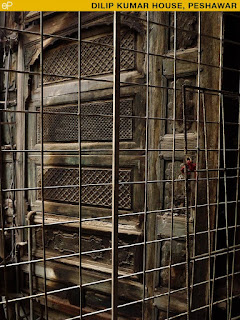A Tale of Heritage: Dilip Kumar's Peshawar Abode
Photo courtesy Zaheer Chaudhry
 In the labyrinthine alleys of Peshawar, amidst the whispers
of history and the rustle of nostalgia, stands a house that transcends its
physical existence—a house that housed the legendary Indian film actor, Dilip
Kumar. Born as Mohammad Yusuf Khan in the heart of Peshawar on December 11,
1922, the house encapsulates the formative years of a cinematic icon.
In the labyrinthine alleys of Peshawar, amidst the whispers
of history and the rustle of nostalgia, stands a house that transcends its
physical existence—a house that housed the legendary Indian film actor, Dilip
Kumar. Born as Mohammad Yusuf Khan in the heart of Peshawar on December 11,
1922, the house encapsulates the formative years of a cinematic icon.
Dilip Kumar, one of twelve siblings, made the transformative journey from Peshawar to Bombay in the late 1930s with his family. His birthplace, now known as the House of Dilip Kumar, is not just a building but a repository of memories that echo with the laughter, dreams, and aspirations of a young boy who would go on to become a cinematic legend.
The significance of this house was officially recognized on July 13, 2014, when it was declared a Pakistani national heritage monument by the then Prime Minister, Nawaz Sharif. The acknowledgment of Dilip Kumar's connection to Peshawar and the preservation of his childhood home symbolize the cultural ties that bind India and Pakistan, transcending geopolitical boundaries.
Dilip Kumar himself made a poignant visit to his ancestral home, a journey that held deep sentimental value. During his visit, he kissed the soil, a gesture that spoke volumes about the emotional resonance he felt with the place of his birth. In 1988, he revisited Peshawar, sharing memories of his childhood and growing up during an interview at the PC Hotel. His recollections, often laced with Hindko and Pashto, painted a vivid picture of a bygone era.
The accolades bestowed upon Dilip Kumar during his illustrious career reached a pinnacle in 1997 when he was honored with Nishan-e-Imtiaz, Pakistan's highest civilian honor. However, the overwhelming crowds prevented him from reaching his childhood home, highlighting the fervent connection people had with this cinematic luminary. The government's attempts to acquire the house underscored its significance as a cultural treasure.
In the pages of his autobiography, "The Substance And The Shadow," Dilip Kumar weaves a narrative that transcends religious and cultural boundaries. He reminisces about the undivided India of his childhood, where Hindus and Muslims coexisted harmoniously. The camaraderie between his family and the Kapoors, another illustrious cinematic family, further illuminates the tapestry of relationships that defined that era.
Dilip Kumar's childhood home is more than a physical structure—it is a bridge across time and borders, a testament to the shared cultural heritage of the Indian subcontinent. As the House of Dilip Kumar stands as a heritage monument, it beckons not just as a tribute to a cinematic legend but as a reminder of the enduring threads that connect us to our past.




















No comments:
Post a Comment